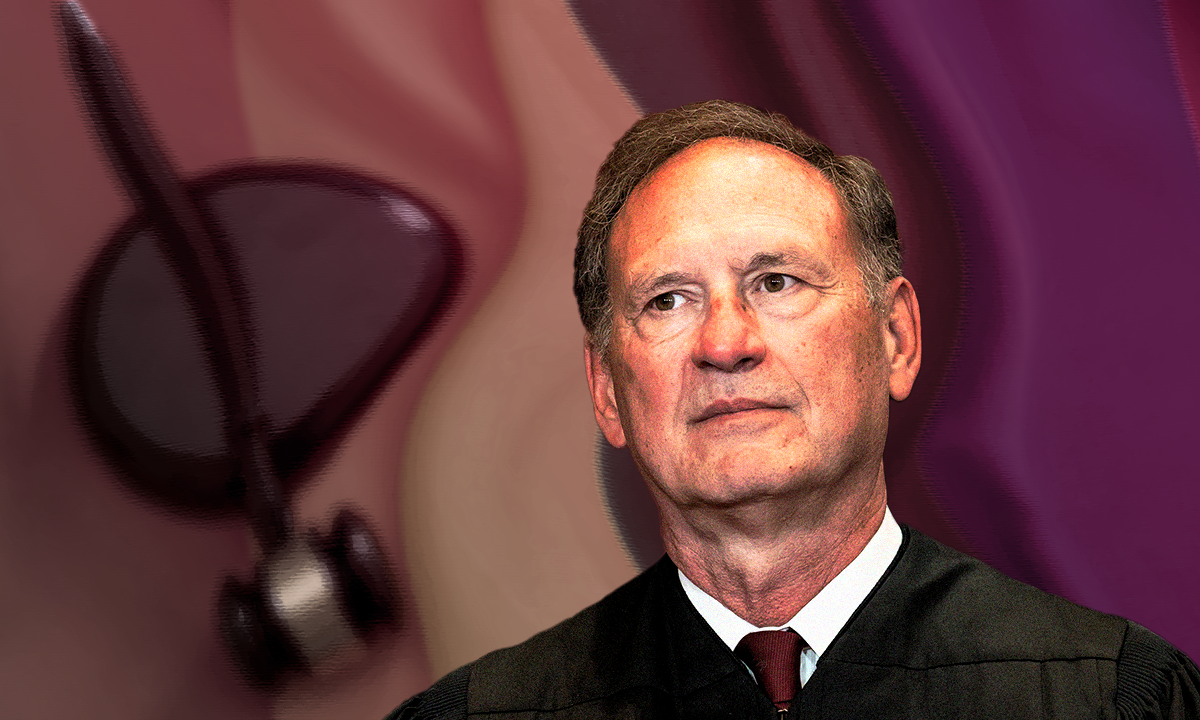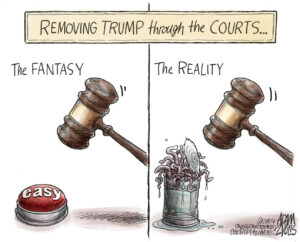Samuel Alito Relaunches His War on Gay Marriage
After the Dobbs decision overturning Roe, no Supreme Court precedent is safe. Graphic by Truthdig
Graphic by Truthdig
Samuel Alito may not be the most corrupt member of the Supreme Court — that distinction goes to Clarence Thomas — but he is easily its most openly homophobic, misogynistic and histrionic. His latest meltdown came in an unusual “written statement” (the functional equivalent of a dissenting opinion) issued on Feb. 20 in a case on jury selection that the court declined to accept for full review, called Missouri Department of Corrections v. Finney. Alito used the statement not only to set forth his deeply flawed legal reasoning on jury selection, but as an opportunity to reiterate his longstanding critique of the constitutional right to same-sex marriage, a stance that has aligned him closely with the Christian nationalist movement that has taken over the Republican Party.
Jean Finney, the plaintiff in the case, is a longtime employee of the Department of Corrections and a lesbian who, court records state, “presents herself as masculine.” She sued her employer, alleging the agency had created a hostile work environment and retaliated against her after she began dating a male co-worker’s former wife. During jury selection in her 2021 trial, her attorney asked prospective jurors a question that went to their capacity to be fair and impartial: “How many of you went to a religious organization growing up where it was taught that people that are homosexuals shouldn’t have the same rights as everyone else because it was a sin with what they did?”
The question was designed to identify individuals who would be prejudiced against Finney, and was one any competent lawyer would have raised. The trial judge subsequently excused two prospective jurors, one a pastor’s wife, who answered that according to the Bible, homosexuality is a sin. The jury returned a verdict in Finney’s favor, awarding her $275,000 in damages.
A brief survey of the dissenting opinions in Obergefell illustrates the depth of conservative opposition to the constitutional right to same-sex marriage.
The DOC appealed, but the Missouri Court of Appeals affirmed the judgment, holding the jurors had been properly dismissed for cause, not because of their Christian faith — that would have been unconstitutional — but because of their views on homosexuality.
After the Missouri Supreme Court declined to review, the DOC filed a petition with the U.S. Supreme Court. All nine justices, including Alito, rejected the petition.
Normally, the high court’s rejection would have been expressed in a one-sentence order. But Alito deemed it necessary to pen a five-page written statement complaining about the disposition. Although he agreed that the DOC had not properly preserved the jurors’ dismissal as an issue for appeal, he explained that, but for this technicality, he would have voted to grant the petition. His reasoning, however, was off the rails and holds dangerous implications for the future of marriage equality and gay rights.
“In this case,” Alito wrote, “the court below reasoned that a person who still holds traditional religious views on questions of sexual morality is presumptively unfit to serve on a jury in a case involving a party who is a lesbian. That holding exemplifies the danger that I anticipated in Obergefell v. Hodges…(2015), namely, that Americans who do not hide their adherence to traditional religious beliefs about homosexual conduct will be ‘labeled as bigots and treated as such’ by the government.”
Obergefell, which recognized same-sex marriage as a constitutional right under the 14th Amendment, is one of the few progressive opinions issued by the Supreme Court this century. However, only two of the justices who comprised the court’s slender five-member majority in that case — Sonia Sotomayor and Elena Kagan — remain on the bench. Three of the dissenters — Alito, Thomas, and Chief Justice John Roberts — also remain.
A brief survey of the dissenting opinions in Obergefell illustrates the depth of conservative opposition to the constitutional right to same-sex marriage. In his dissent, Roberts wrote: “The majority’s decision is an act of will, not legal judgment. The right it announces has no basis in the Constitution or this Court’s precedent.”
Thomas noted in his: “The Court’s decision today is at odds not only with the Constitution, but with the principles upon which our Nation was built. Since well before 1787, liberty has been understood as freedom from government action, not entitlement to government benefits.”
None protested as vociferously as Alito, who argued the issue of same-sex marriage should be deferred to the states. He wrote:
Today’s decision usurps the constitutional right of the people to decide whether to keep or alter the traditional understanding of marriage. The decision will also have other important consequences. It will be used to vilify Americans who are unwilling to assent to the new orthodoxy… I assume that those who cling to old beliefs will be able to whisper their thoughts in the recesses of their homes, but if they repeat those views in public, they will risk being labeled as bigots and treated as such by governments, employers, and schools.
Since then, Alito has embarked on a mission to reverse Obergefell. As he argued in his infamous 2022 majority decision in Dobbs v. Jackson Women’s Health Organization, the landmark abortion case, the states should decide the fate of same-sex unions.
As Linda Greenhouse observed in a 2022 column for The New York Times, it is religious doctrine, not the Constitution, that drives Alito’s jurisprudence.
In 2020, he joined Thomas in a wildly emotional dissent from the court’s refusal to take up an appeal filed on behalf of Kim Davis, the former Rowan County, Kentucky clerk who refused to issue licenses for gay marriages. The same year, in a speech delivered online to the Federalist Society, Alito complained that America is no longer “inclusive enough to tolerate those with unpopular religious beliefs” and that “religious liberty is fast becoming a disfavored right.”
As Linda Greenhouse observed in a 2022 column for The New York Times, it is religious doctrine, not the Constitution, that drives Alito’s jurisprudence. In a similar vein, New Yorker staff writer Margaret Talbot described Alito in a 2022 essay as a leading figure in the “crusade against a secular America,” animated by anger and an abiding sense of aggrievement.
The problem for defenders of marriage equality and gay rights is that the moderate Obergefell majority — which included Breyer, Kennedy and Bader Ginsburg — has been supplanted by an ultra-right super majority. There is no telling when a new direct challenge to Obergefell will reach the Supreme Court. But sooner or later, one will. A majority of states still have bans on gay marriage on their books. Some, like Tennessee, which recently enacted a law permitting public officials, including judges, to refuse to perform same-sex marriages, could offer anti-gay litigants a direct path.
It took 49 years for the court to overrule Roe v. Wade. Obergefell, which has been the law for a mere nine, is far more vulnerable. Samuel Alito is eager to dispatch it to the dustbin.
Your support matters…Independent journalism is under threat and overshadowed by heavily funded mainstream media.
You can help level the playing field. Become a member.
Your tax-deductible contribution keeps us digging beneath the headlines to give you thought-provoking, investigative reporting and analysis that unearths what's really happening- without compromise.
Give today to support our courageous, independent journalists.






This is 2024.